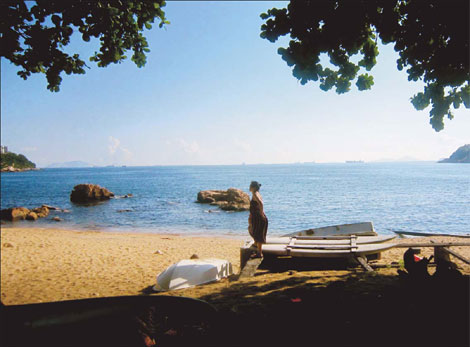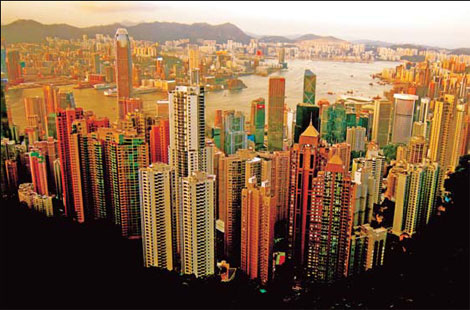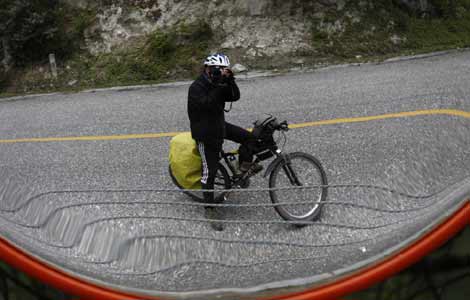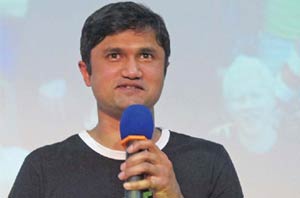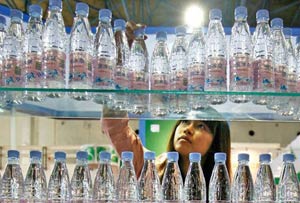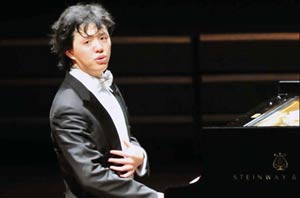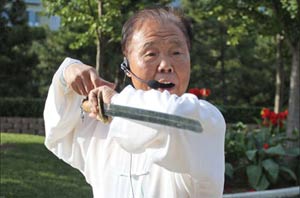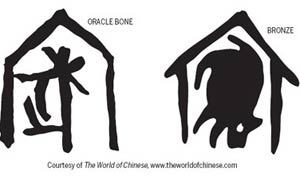Sun, sea, sand ... and Starbucks
Updated: 2011-10-10 11:02
By Mark Hughes (China Daily)
|
|||||||||
|
Stanley Beach, on Hong Kong island's south side, houses an air-conditioned market and bars overlooking the waterfront. Mark Hughes / For China Daily |
Hong Kong's sparkling tableau of attractions has everything for the ideal family vacation, as father-of-two traveler Mark Hughes discovers.
The challenge was this: Where should I take my two English daughters aged 8 and 13 for their first holiday in Asia? Because of their youth and the difference in their ages, it had to be somewhere diverse, interesting, fun but not too arduous.
It didn't take me long to come up with the ideal location: Hong Kong. As my father was joining us from the United Kingdom and had last visited the former British colony in 1954 as a serviceman, it would also be an eye-opener for him.
Having lived there for two years in the '90s, Hong Kong is a destination I know very well. It has wonderful beaches, enjoyable hikes through verdant countryside, great restaurants, superb shopping and a vibrant mixture of other attractions. Although it is very Asian, it possesses enough Western elements such as the ubiquitous Starbucks coffee chain to perk up the spirits of the most homesick little Englander.
As an American friend of mine used to say, it is "China Lite".
The deal-clincher for my youngest daughter was that it has a Disneyland, albeit a small one with plans to expand by more than 20 percent later this year. Although she adored meeting Minnie Mouse, riding the tea cups, the merry-go-round, a hair-raising, knuckle-whitening fast indoor roller coaster and a delightful fireworks show, what my youngest hadn't been prepared for was the delights of the award-winning Ocean Park.
There she marveled at the exotic fish in the Grand Aquarium, including sharks, rays and Picasso trigger fish, shrieked in delight at seeing for the very first time pandas eating bamboo shoots ("Just like you see on the television") and howled with laughter at the antics of dolphins, a sea lion and their keepers during the daily show at the Ocean Theater.
Other attractions include a cable car ride, a Crazy Galleon pendulum boat, a Ferris wheel, a flying swing, The Abyss Turbo Drop and Hong Kong's largest roller coaster, The Dragon, all set in a beautiful hillside location on the south of Hong Kong island.
One of the things about this once-barren rock is its emphasis on the vertiginous. As if to challenge the high, natural grandeur of the Peak, man has built a plethora of his own skyscrapers, including the relatively new Sky100 Observation Deck in Kowloon, which is currently the world's fourth tallest publicly accessible building at more than 490 meters.
From here you can enjoy a fine panorama of the special administrative region. Even on cloudy days, the electronic telescopes offer video views of the surrounding environment as well as a fireworks show in the harbor. It is possible to walk through an air-conditioned underground mall packed with designer stores and alluring eateries from Tsim Sha Tsui East MTR station or the Star Ferry terminus all the way to the tower if the heat and humidity prove to be too much.
During our two weeks, we also took advantage of a glass-bottomed cable car ride to Ngong Ping, home of the world's largest seated Buddha. Since I lived in Hong Kong, a thriving commercial street has been built featuring shops, theaters and diners including, yes, the aforementioned Starbucks. We took the cable car back against the backdrop of an iridescent sunset over the South China Sea, a truly memorable occasion that silenced the gaggle of children accompanying us.
More fun was had with a sail around the harbor in the Duk Ling traditional Chinese junk, a morning learning how to make cute-looking but delicious dim sum in a regular class held at Super Star Seafood Restaurant in Times Square, Causeway Bay, a Chinese tea-appreciation class at Lok Cha Teashop in Hong Kong Park and a tai chi lesson in Sculpture Park, in front of the Hong Kong Museum of Modern Art in Tsim Sha Tsui.
We also spent a delightful day in Stanley, on Hong Kong island's south side, hunting out bargains in the now air-conditioned market and eating and drinking in a bar overlooking the waterfront. The village now has a McDonald's and, yes, a Starbucks.
One thing that surprised me when I lived in Hong Kong was the natural surroundings: stunning country parks and wonderful beaches. Young children love the combination of sand, sea and sunshine, and took full advantage of it. They had never experienced seawater as warm as the South China Sea before and swam and splashed around for hours, carefully protected by strong sun block.
Twice we visited Cheung Sha beach on Lantau island, where there is a South African-themed beach restaurant, The Stoeppe, so the adults could relax and keep an eye on the youngsters at play. They were delighted when a herd of friendly pygmy-like dairy cattle that roam free on the island wandered down toward evening to enjoy sitting on the warm sand in a defensive circle.
Our other beach outing was to Shek O on Hong Kong island's south side. It's an old, labyrinthine fishing village where I lived for several months with splendid sands, good showers, lifeguards and a famous Thai restaurant still featuring a photo of Chris (now Lord) Patten dining there when he was the last British governor of the then dependent territory. My, he looks young in it.
One thing I noticed in all our ventures was the prevalence of Mandarin. Every tourist venue was packed with mainlanders.
According to the Hong Kong Tourism Board, in the first six months of 2011, arrivals from the Chinese mainland increased by 21.1 percent over the same period last year to more than 12 million. A total of 64.5 percent of them, close to 8.2 million, came under the Individual Visit Scheme. That is 28.6 percent more than the same period last year. Within June 2011, the number of mainland arrivals increased by 23.1 percent year-on-year to more than 1.92 million. This marked the fourth consecutive month since March this year in which growth of more than 20 percent was registered for the mainland market.
More South Koreans are also visiting. In June alone, arrivals from the peninsula state went up by 37.3 percent to nearly 80,000.
Clearly Hong Kong is doing something right on the tourism front. For those who like statistics, 19,331,181 people visited Hong Kong from January to June this year, an increase of 14.7 percent on the same period last year. Outside Asia, the largest sector came from Europe, the Middle East and Africa at 1,054,228, a miserly increase of 1.3 percent on last year's June to January figures. The number from the Americas was up 6 percent at 886,383.
Tourism bosses put the big rise in visitors from Southeast Asia down to relatively stable political and economic conditions, coupled with increased flights to Hong Kong, as well as competitively priced air tickets and packages by the travel trade. In June arrivals from Indonesia, Singapore and Thailand were up 26, 20.9 and 32.1 percent respectively on last year's figures. Arrivals from Russia were up more than 50 percent in June and during the first six months of the year, the latter figure reaching nearly 60,000.
By far the European country with most visitors to Hong Kong is its old colonial master, the United Kingdom, with 29,933 visitors in June this year, down slightly on June 2010, and 257,247 in the first six months, down again slightly on the first six months of June 2010.
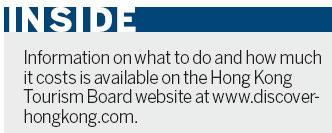
Finally, no trip to Hong Kong is complete without traveling up the Peak Tram and watching the sun set from the deck of what is now a bustling hub of commerce, featuring a huge variety of shops and restaurants.
What was once a simple commuter trip for the wealthy inhabitants and their servants or those who wanted to escape the often oppressive humidity of the thronging streets of Central for a walk in the cooler climes above is now a major tourist attraction with long queues and steeper but affordable fares.
It's well worth it. As the sun falls behind Lamma island, the lights of the city start to come on. And by nightfall there before you is a mesmerizing tableau of twinkling, flashing, racing, color-changing radiance, like diamonds on a velvet blanket. It's the best memory to leave with.
And the children's verdict. "Amazing." They said it was the best holiday they had ever been on and did not want to leave.
You may contact the writer at sundayed@chinadaily.com.cn.
|
The view from The Peak presents a fine panorama of the special administrative region. |
